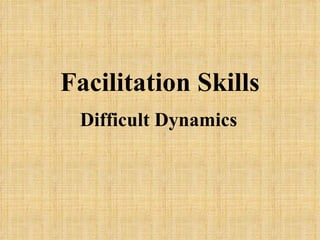
Facilitation skills ppt
- 1. Facilitation Skills Difficult Dynamics
- 3. Problem Typical Mistake Effective Response Domination by a highly verbal member Inexperienced facilitators often try to control this person. "Excuse me Mr. Q, do you mind if I let someone else take a turn?" Or, even worse, "Excuse me, Ms. Q, you're taking up a lot of the group's time..." When one person is over- participating, everyone else is under-participating. So, focus your efforts on the passive majority. Encourage them to participate more. Trying to change the dominant person merely gives that person all the more attention. Goofing around in the midst of a discussion It's tempting to try to “organize" people by getting into a power struggle with them. "Okay, everybody, let's get refocused." This only works when the problem isn't very serious. Aim for a break as soon as possible. People have become undisciplined because they are overloaded or worn out. After a breather, they will be much better able to focus.
- 4. Low participation by the entire group Low participation can create the impression that a lot of work is getting done in a hurry .This leads to one of the worst errors a facilitator can make: assume that silence means consent, and do nothing to encourage more participation. Switch from large-group open discussion to a different format that lowers the anxiety level. Often, idea-listing is the perfect remedy. If safety is a major concern, small group activities are very important. Quibbling about trivial procedures Lecture the group about wasting time and spinning our wheels. Space out, doodle, and think to yourself, "It's their fault we're not getting anything done." Have the group step back from the content of the issue and talk about the process. Ask the group, “'What is really going on here?"
- 5. Problem Typical Mistake Effective Response Someone becomes strident and repetitive At lunch, talk behind the person's back. Tell the person in charge that s/he must take more control. Confront the person during a break. Then, when the meeting resumes, act surprised when his/her anxiety goes through the roof! People repeat themselves because they don't feel heard. Summarize the person's point of view until s/he feels understood. Encourage participants to state the views of group members whose views are different from their own. Someone discovers a completely new problem that no one had previously noted Try to come up with reasons why the group would not need to focus on that issue. Pretend not to hear the person's comments. Wake up! This may be what you've been waiting for: the doorway into a new way of thinking about the whole situation.
- 6. Minimal participation by members who don’t feel invested in the topic Act as though silence signifies agreement with what's been said. Ignore them and be thankful they're not making trouble. Look for an opportunity to have a discussion on, "What's important to me about this topic?" Have people break into small groups to begin the discussion. This gives everyone time to explore their own stake in the outcome. Poor follow through on assignments Give an ineffective pep-talk. Ignore it. “We didn't really need that information anyway." Put most of the responsibility on one or two people. Have people do assignments in teams. Build in a report-back process at a midpoint before the assignment is due. This gives anyone having trouble a chance to get help.
- 7. Problem Typical Mistake Effective Response Failure to start on time and end on time Wait for the arrival of all the people who count. This obviously means starting late, but hey, what else can you do? When it's time to end, go overtime without asking. If anyone has to leave, they should tiptoe out. Start when you say you’re going to start. (Waiting encourages lateness.) If you must go overtime, call a break so people can phone home. If going overtime is recurrent, improve your agenda planning. Two people locking horns A lot of time can get wasted trying to resolve a conflict between two people who have no intention of reaching agreement. People often use one another as sparring partners, in order to clarify their own ideas. Reach out to other members and say, "Who else has an opinion on this issue?" or, "Let's step back for a minute. Are there any other issues that need to be discussed?" Remember: don't focus your attention on the dominant minority, focus on the passive majority.
- 8. One or two silent members in a group whose other members participate actively "Mr. Z, you haven't talked much today. Is there anything you'd like to add?" This may work when a shy member has non-verbally indicated a wish to speak. But too often, the quiet person feels put on the spot and withdraws further. "I'd like to get opinions from those who haven't talked for a while." Breaking into small groups works even better. Small groups allow shy members to speak up without having to compete for air time. Whispering and side jokes Facilitators commonly ignore this behavior in the hope that it will go away. Sometimes it does, but it frequently gets worse. With warmth and humor, make an appeal for decorum. "As you know, those who don't hear the joke often wonder if someone is laughing at them." If the problem persists, assume there's a reason. Has the topic become boring and stale? Do people need a break? Or the reverse; maybe everyone needs time for small group discussion.
- 9. I hope this presentation was Helpful. Thank You!
